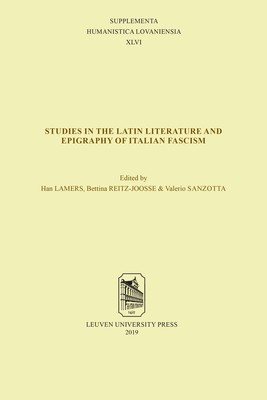
- Išsiųsime per 10–14 d.d.
- Leidėjas: Leuven University Press
- ISBN-10: 9462702071
- ISBN-13: 9789462702073
- Formatas: 15.6 x 23.4 x 2 cm, minkšti viršeliai
- Kalba: Anglų
- Extra -15 % nuolaida šiai knygai su kodu: ENG15
Studies in Latin Literature and Epigraphy in Italian Fascism + nemokamas atvežimas! | knygos.lt
Atsiliepimai
Aprašymas
This book deals with the use of Latin as a literary and epigraphic language under Italian Fascism (1922-1943). The myth of Rome lay at the heart of Italian Fascist ideology, and the ancient language of Rome, too, played an important role in the regime's cultural politics. This collection deepens our understanding of 'Fascist Latinity', presents a range of previously little-known material, and opens up a number of new avenues of research. The chapters explore the pivotal role of Latin in constructing a link between ancient Rome and Fascist Italy; the different social and cultural contexts in which Latin texts functioned in the ventennio fascista; and the way in which 'Fascist Latinity' relied on, and manipulated, the 'myth of Rome' of late nineteenth- and early twentieth-century Italy.
Contributors: William Barton (Ludwig Boltzmann Institute for Neo-Latin Studies), Xavier van Binnebeke (KU Leuven), Paolo Fedeli (Università degli Studi di Bari Aldo Moro), Han Lamers (University of Oslo), Johanna Luggin (Ludwig Boltzmann Institute for Neo-Latin Studies), Antonino Nastasi (Rome), Bettina Reitz-Joosse (University of Groningen), Dirk Sacré (KU Leuven), Valerio Sanzotta (Ludwig Boltzmann Institute for Neo-Latin Studies), Wolfgang Strobl (Toblach)
EXTRA 15 % nuolaida su kodu: ENG15
Akcija baigiasi už 1d.17:24:09
Nuolaidos kodas galioja perkant nuo 10 €. Nuolaidos nesumuojamos.

- Leidėjas: Leuven University Press
- ISBN-10: 9462702071
- ISBN-13: 9789462702073
- Formatas: 15.6 x 23.4 x 2 cm, minkšti viršeliai
- Kalba: Anglų
This book deals with the use of Latin as a literary and epigraphic language under Italian Fascism (1922-1943). The myth of Rome lay at the heart of Italian Fascist ideology, and the ancient language of Rome, too, played an important role in the regime's cultural politics. This collection deepens our understanding of 'Fascist Latinity', presents a range of previously little-known material, and opens up a number of new avenues of research. The chapters explore the pivotal role of Latin in constructing a link between ancient Rome and Fascist Italy; the different social and cultural contexts in which Latin texts functioned in the ventennio fascista; and the way in which 'Fascist Latinity' relied on, and manipulated, the 'myth of Rome' of late nineteenth- and early twentieth-century Italy.
Contributors: William Barton (Ludwig Boltzmann Institute for Neo-Latin Studies), Xavier van Binnebeke (KU Leuven), Paolo Fedeli (Università degli Studi di Bari Aldo Moro), Han Lamers (University of Oslo), Johanna Luggin (Ludwig Boltzmann Institute for Neo-Latin Studies), Antonino Nastasi (Rome), Bettina Reitz-Joosse (University of Groningen), Dirk Sacré (KU Leuven), Valerio Sanzotta (Ludwig Boltzmann Institute for Neo-Latin Studies), Wolfgang Strobl (Toblach)




Atsiliepimai